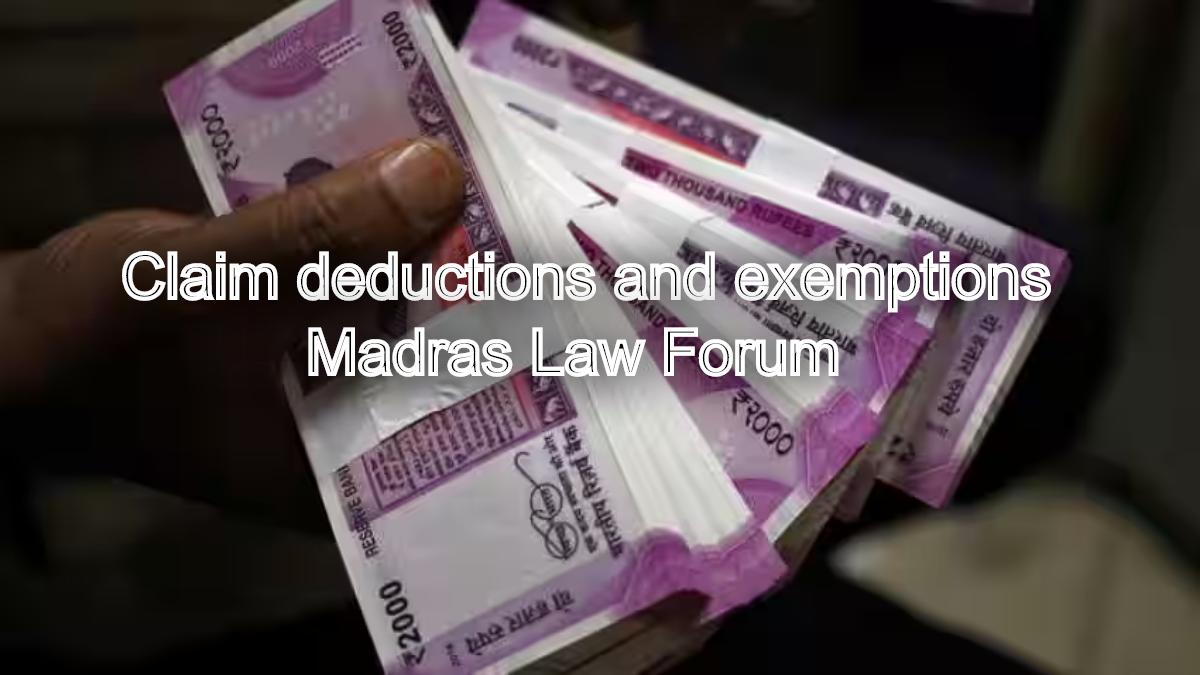How can I claim deductions: The Income Tax Act of 1961, a cornerstone of India’s tax system, governs the taxation of income earned by individuals, companies, and other entities. While income is taxed, the Act also provides for various deductions and exemptions to mitigate the tax burden. This article will delve into the key deductions and exemptions available to taxpayers, particularly focusing on provisions relevant to individuals.
How Can I Claim Deductions and Exemptions Under the Income Tax Law: Madras Law Forum
Understanding Deductions and Exemptions
Before exploring specific provisions, it’s crucial to understand the fundamental differences between deductions and exemptions.
- Deductions: These are amounts that are subtracted from your total income before calculating your taxable income.
- For example: Section 80C deductions, which encompass investments like Public Provident Fund (PPF), Employee Provident Fund (EPF), and life insurance premiums.
- Exemptions: These are specific types of income that are entirely excluded from taxation.
- For example: Income from agricultural sources (subject to certain limits) and income received by individuals below a certain age from specified sources are typically exempt.
Key Deductions Under Section 80C
Section 80C of the Income Tax Act is a significant provision offering a wide range of investment options for tax savings. Some prominent deductions under this section include:
- Investments in PPF, EPF, and other approved schemes: Contributions to these schemes are eligible for deductions up to a limit of ₹1,50,000 per annum.
- Life insurance premiums: Premiums paid for life insurance policies are deductible up to a certain limit.
- Tuition fees: Payment of tuition fees for children’s education is also eligible for deduction.
- Home loan principal repayment: Principal repayment of home loans taken for self-occupied or rented properties is deductible up to a limit of ₹1,50,000 per annum.
- Investments in National Savings Certificates (NSCs) and other eligible instruments: Investments in these instruments can also be claimed as deductions under Section 80C.
Deductions Under Other Sections
Besides Section 80C, several other sections provide for important deductions:
- Section 80D: This section allows deductions for medical insurance premiums paid for self, spouse, dependent children, and parents.
- Section 80E: Deduction is available for interest paid on education loans.
- Section 80GG: Rent paid by individuals residing in rented accommodation who do not receive House Rent Allowance (HRA) from their employer is deductible under this section, subject to certain conditions.
Exemptions Under the Income Tax Act
Several income sources are exempt from taxation under the Income Tax Act. Some key exemptions include:
- Agricultural income: Income from agricultural sources is generally exempt from tax, subject to certain conditions.
- Income from specified sources for individuals below a certain age: Income received by individuals below a certain age from specified sources, such as dividends from certain companies, is exempt from tax.
- Income of a spouse: Income earned by a spouse can be clubbed with the income of the other spouse under certain circumstances, effectively reducing the overall tax liability.
Claiming Deductions and Exemptions
To claim deductions and exemptions, taxpayers must maintain proper records of all eligible expenses and investments. These records should be carefully documented and presented during the income tax filing process.
- Income Tax Returns (ITRs): Taxpayers are required to file ITRs annually, declaring their income and claiming eligible deductions and exemptions.
- Supporting documents: It is crucial to maintain supporting documents such as investment certificates, insurance policies, medical bills, and rent receipts to substantiate the claims made in the ITR.
Importance of Expert Advice
The Income Tax Act is a complex piece of legislation with numerous provisions and intricate rules.
- Navigating the complexities: Navigating these complexities and ensuring accurate claim of deductions and exemptions can be challenging for individual taxpayers.
- Seeking professional guidance: Seeking professional guidance from a qualified chartered accountant or tax consultant is highly recommended.
- Expert advice: These professionals can provide expert advice on the most suitable deductions and exemptions based on individual circumstances and help ensure compliance with all relevant tax laws.
Frequently Asked Questions
Deductions are amounts subtracted from your total income before calculating your taxable income. Examples include investments in PPF, EPF, and life insurance premiums.
Exemptions are types of income entirely excluded from taxation. Examples include agricultural income and income received by individuals below a certain age from specified sources.
Section 80C offers a wide range of investment options for tax savings.
Deductions under this section include contributions to PPF, EPF, life insurance premiums, tuition fees, and home loan principal repayment.
The maximum deduction limit under Section 80C is currently ₹1,50,000 per annum.
Yes, Section 80D allows deductions for medical insurance premiums paid for self, spouse, dependent children, and parents.
Maintain proper records of all eligible expenses and investments.
File your Income Tax Return (ITR) annually, declaring your income and claiming eligible deductions and exemptions.
Submit supporting documents such as investment certificates, insurance policies, medical bills, and rent receipts.
Navigating the complexities of the Income Tax Act can be challenging.
A qualified chartered accountant or tax consultant can highly recommend seeking guidance to ensure accurate claims of deductions and exemptions and compliance with all relevant tax laws.
Conclusion
Understanding and effectively utilizing the deductions and exemptions available under the Income Tax Act is crucial for minimizing tax liability.
- Maximizing tax savings: By carefully planning investments and expenses, taxpayers can maximize tax savings and optimize their overall financial well-being.
- Staying updated: It is essential to stay updated with the latest changes and amendments to the Income Tax Act to ensure compliance and maximize tax benefits.
Read More
- What is administrative law in India? Expert Legal Remedies
- How Can I seek legal remedies for issues related to dowry harassment or cruelty? Expert Advice
- Can I seek tax planning and advisory services from a tax law advocate?
- Can I seek legal remedies or representation for tax disputes and assessments?
- What is tax law in India? Expert Taxation Lawyers in Chennai
- Income Tax Department Website:
